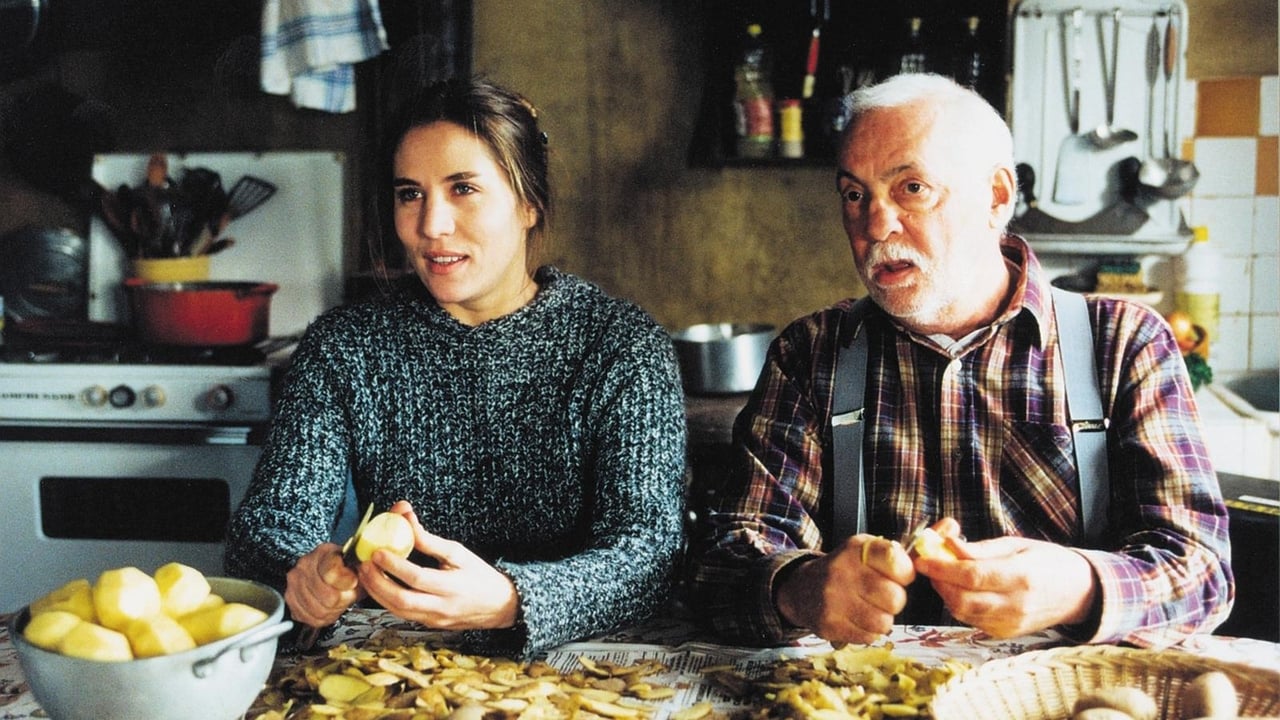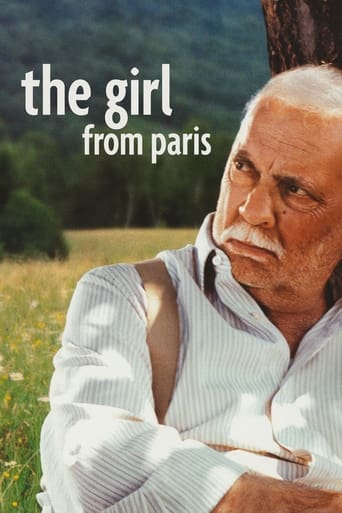



It isn't all that great, actually. Really cheesy and very predicable of how certain scenes are gonna turn play out. However, I guess that's the charm of it all, because I would consider this one of my guilty pleasures.
View MoreIt's the kind of movie you'll want to see a second time with someone who hasn't seen it yet, to remember what it was like to watch it for the first time.
View MoreIt is an exhilarating, distressing, funny and profound film, with one of the more memorable film scores in years,
View MoreIt's a good bad... and worth a popcorn matinée. While it's easy to lament what could have been...
View MoreSandrine, a Parisian young woman who works in computers, has had it! She announces to her mother that after taken the course in agriculture she is going to buy a farm and leave Paris. The training she must undergo is not for the feint hearted, or people with weak stomachs. The graduates must know all there is to know in order to run a successful business under hard conditions.The farm Sandrine sets her eyes on is owned by Adrien, a lonely man of a certain age who has had it. He plans to move with his relatives in Grenoble. The farm he owned and worked all his life is in the Rhone-Alpes region of France. Situated on a picturesque spot in that area, Sandrine buys it and begins to transform the place. Adrien's only condition is that he wants to stay in his own house for the next eighteen months. Sandrine, who wants to get the farm, agrees.It becomes clear from the start Adrien doesn't think much of Sandrine's methods. Being computer savvy, she begins to sell her goat cheeses in the Internet. She also takes in guests in the modern barn she transformed. Sandrine also doesn't quite like the old man because she perceives how much he doesn't approve of her changes to his farm. Adrien, who begins to warm up to the girl, makes the first move to annoy Sandrine by doing something to the electricity. That sends her to ask his help in letting her stay with him as it has snowed heavily and her place is freezing.Adrien begins to relax around the young woman as he lets her know about himself and the life he and his wife had together in the farm. Little by little, both come together and form a bond that will not be broken because both learn to care for the other one.Christian Carion directed this tale about two lonely souls that are much alike, but live in separate worlds. The film is sympathetic to the young woman who decides to pack her glamorous job and make a living on her own in another field. The great asset the director had was the casting of Mathilde Seigner and veteran actor Michel Serrault, who must have suffered an accident, judging by the way his face looks. Both actors give naturalistic performances that warm the viewer's heart as they discover how alike they both are. Jean-Paul Roussillon and Frederic Pierrot appear in supporting roles.Mr. Carion made a life affirming movie that will delight audiences that discover it.
View MoreThis is a very nice movie that most English-speaking movie goers will never see. Here in the USA it has the title "Girl From Paris", but the French title translates to "one swallow brought spring." Mathilde Seigner, unknown to me before this movie, plays Sandrine Dumez, a single young lady, approaching 30, and living in Paris. One day while running late because of bad traffic, she decides to follow her dream, to get away from the city and become a farmer. This is her story, and also how her life touched that of an old man who thought he had nothing to live for. She was his 'swallow'. Although it is all in French, the subtitles are easy to read and is not a distraction at all. I would recommend it to anyone who likes a good story.SPOILERS FOLLOW. Sandrine enrolls in a two year school to study farming. She is one of the better students and a hard worker. She finds a farm to buy in a beautiful hilly area somewhere between Paris and Grenoble, probably closer to Grenoble. The old owner had lost his wife some years back, and was just tired of farming, but he didn't look kindly upon "school" farmers, and wasn't very helpful at first. In fact it seemed like he wanted her to fail, even though he had contracted to remain living there for 18 months. But he slowly warmed up to her when he saw how kind she was, and how hard she worked. She converted one building into a hotel and advertised it over the internet as "Balconies in the Sky." She sold her goat cheese over the internet. She worked hard every day. Her business was good.In a key scene during the cold winter, we see him causing a problem with her hotel's electricity, and we assume he is up to no good. But, what he wanted was for her to be near him, so without heat, he invited her to stay with him in the old guest bedroom. A few days later, he fixed the problem. They shared meals and conversation, and they even danced. Not long before, a sour old man, he now had a little joy in his life.After a particularly hard winter, Sandrine had to take a break, went back to Paris, even taught two days of an internet class. She considered whether she should go back, and decided to. The movie ends with her leading the goats back to the barn in the spring.
View MoreIt's formulaic, of course, but the trick with formulas is to act as if they're NOT formulaic and play it as if it were the most original story that ever came down the Pike. And that's what we get here, a charming, dazzling and ultimately Moving film that explores as if for the first time age-old concerns. Serrault has been here before in Nelly and Monsieur Arnaud so this is a good time to deal with the six degrees of separation aspect. In 'Nelly' Serrault was the older man and Manu Beart the younger woman; in Manon des Source Manu Beart tended goats and here Mathilde Seigneur does the same thing. So much for trivia. They really put more than the usual five minutes thought into this one because the credits come up over breathtaking aeriel shots of the Vercours and you can see why so many English people are inspired to buy second homes in France or even move there entirely. This is reinforced when in the first sequence we cut to Sandrine (Seigneur) caught up in a traffic jam in Paris and looking thoughtfully at a travel poster of Vercours on a bus in front of her. This is economical storytelling and in the very next scene she is telling her mother of her decision to move to the Vercours - in the Rhone Alps - and become a goat-farmer. The mother can't understand, natch, why a girl born and bred in Paris and a successful computer instructor would want to give it all up to become a sort of recluse about town. So we get the argument out of the way in the first reel. Sandrine is a gifted student, one of the best in Agricultural school and soon she is ready to invest 450,000 Francs in a remote goat farm. The farm belongs to old Adrien (Michel Serrault) and he comes with it, at least til he can move into his new flat in Grenoble some 18 months away. We are now ready for the classic battle of Old versus New, Young versus Old, initial antagonism giving way to mutual affection. Like I said, we've seen it all before. But what we HAVEN'T seen before is two Class Acts like Serrault and Seigneur and what they serve up is pure DELIGHT. We are spared nothing, this isn't a Travelogue because after an idyllic Summer comes the Winter of Discontent, so bad that Seigneur seriously considers throwing in the towel. Essentially a two-hander that stands or falls by the the quality of the two pricipals it is also fleshed out with really strong support in the shape of Adrien's neighbor and contemporary, Sandrine's colleague from Paris and sometime lover, and her mother. This is the kind of movie that Hollywood has completely forgotten how to make and which the accountants who run the place wouldn't sanction anyway. Thank God the French and other European countries can still turn them out like this. 10/10
View MoreI just saw this 2-year-old film at the Seattle International Film Festival, as a substitute for a scheduled Czech film (Brats) which arrived with missing reels, and was glad to have seen it, since a movie like this is very unlikely to go into US distribution. I won't repeat points that have already been made here several times, other than to say that this is very much in the European humanist tradition, with actors whose faces are beleivable and have character rather than formuaic good looks, and a plot centered on real life. The very scenic setting is also one of the film's great strengths. This film indirectly helped me to understand the motivation of periodically striking French farmers, and the hold that this way of life can have on Europeans, where farming is not as easy, as industrialized, or as large-scale as it is in much of America.Unfortunately, the script doesn't probe quite as deeply as it might, and POSSIBLE MINOR SPOILERS: there is a silly recurring bit of gratuitous and vague symbolism in the form of a para-sailer that leads nowhere, and acts mainly as eye-candy. The same can be said about the unnecessarily virtuosic (and at times vertiginous) long opening shot. I'm undecided about the scenes of violence to animals. Yes, living things were harmed -- killed, really -- in the making of this movie, and it could have been made without those acts, but such things are a common and unavoidable part of farm life, and lend reality to a sometimes romanticized portrayal of agricultural existence. On balance, I think this depiction is legitimate, and the scene with the cows may have been pre-existing footage. (It was definitely stock-footage, in a manner of speaking.)END OF SPOILERSNot a great or major piece of cinema, but a worthy minor human document, with especially fine acting by the heroine and the two old farmers.
View More